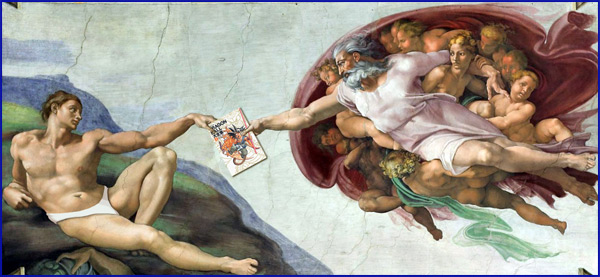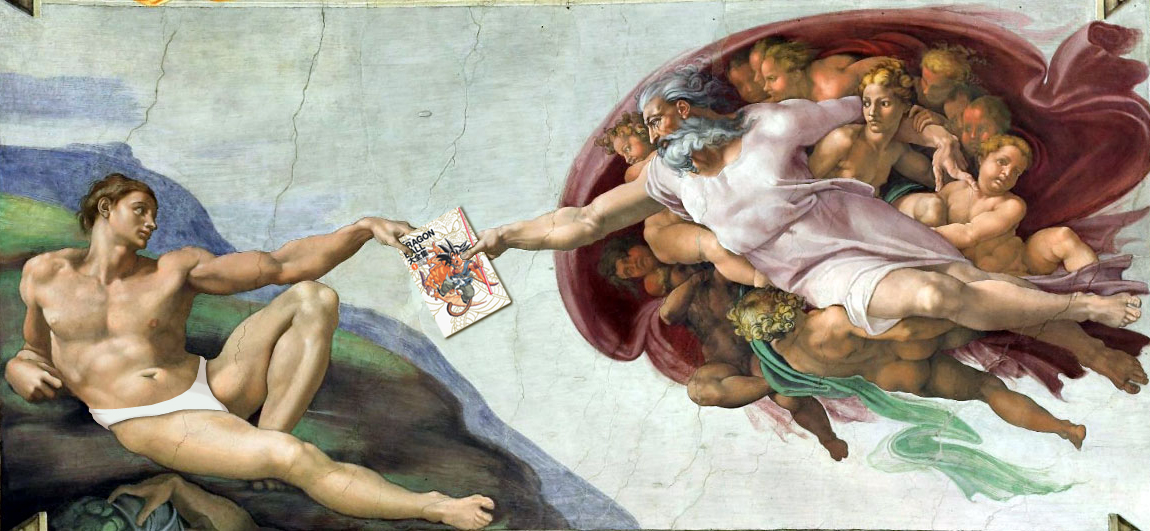AUTHOR’S NOTE: This blog post was written in late 2011, about a year before Battle of Gods and about three years before Dragon Ball Super. It’s a little rough around the edges in terms of writing, but in particular I’m rather proud of how SPOT-ON PROPHETIC it is… not in terms of calling us getting a new series, but with regard to fandom’s canonical categorization split.
It’s that time of year — there is a new Dragon Ball production (the animated adaptation of Episode of Bardock), and all the fans across the Internet want to know:
“Is it canon?”
Actually, they all ask if it’s “cannon”, and these people should all be promptly shot out of a cannon.
Back in August 2008 on Episode #0145 of our podcast over at Daizenshuu EX, we talked with our buddy Desire Campbell about the idea of “canonicity” with the Dragon Ball franchise. I’m pretty sure I remember a good deal of what we talked about, but if you’re looking for more (and someone else’s perspective, which is always important), definitely check out the episode.
It might be important to actually define what “canon” means. Let’s ask our good friends over at Merriam-Webster (yes, I just did the total-hack dictionary definition thing):
1a : a regulation or dogma decreed by a church council
b : a provision of canon law
2
[Middle English, from Anglo-French, from Late Latin, from Latin, model] : the most solemn and unvarying part of the Mass including the consecration of the bread and wine
3
[Middle English, from Late Latin, from Latin, standard]
a : an authoritative list of books accepted as Holy Scripture
b : the authentic works of a writer
c : a sanctioned or accepted group or body of related works <the canon of great literature>
4
a : an accepted principle or rule
b : a criterion or standard of judgment
c : a body of principles, rules, standards, or norms
5
[Late Greek kanōn, from Greek, model] : a contrapuntal musical composition in which each successively entering voice presents the initial theme usually transformed in a strictly consistent way
More often than not, you’ll see “canon” tossed out there with regard to religion. Lo-and-behold, most of the definitions you’ll see will thusly head in that direction. You’ve got things like the Dead Sea Scrolls, which were not “canonized” into the Bible. In other words, some dudes decided that those particular words written by some other dudes weren’t what they wanted to bank on and teach to more other dudes.
And that’s really the big difference between the Bible and Dragon Ball (among… uhh… a gazillion other things, I guess). Whereas the Bible has THE CHURCH™ to define which particular collection of stories into one book (and even which translation) they abide by, there is nothing like that with Dragon Ball. Sure, there are the ultimate rights holders and production companies, but none of them have ever come out and said, “Look upon ye’ official canonicalness!” and pointed over to a very specific number and type of books. No-one has ever blatantly said, for example, “movies don’t count” or “GT never happened”.
There are a couple things you might toss out there, though. “Hey dumbass!” you may say, “Toriyama said DBGT was just a side-story!” You would be correct, Mr. Rude Fan! In his introduction to the DBGT Dragon Box, Toriyama wrote, “DragonBall GT is a grand side-story of the original DragonBall, and it’ll make me happy for us to watch and enjoy it together.” What does that mean, though? Is he saying he personally does not consider it part of the story (and whether he does or does not, what does it matter to you?), or is he just making a general, sweeping statement?
You may go on to say, “Hey jerkface! Those diaz books put the movies on the same timeline as the manga, so it thinks they count!” You would be somewhat correct there, as well! At points, the daizenshuu will note how, if it had to fit, a particular DBZ movie would possibly fit in at Story-Point-X… but then go on to say that it would be impossible for it to work out that way. They acknowledge them, though, so are they considering anything they talk about part of the canon?
Which brings me right back to my main point: no-one’s ever sat down and said, “Mmm, yes… we consider the official story to be the original 519 chapters as written by Akira Toriyama, plus these other things, and absolutely nothing else what-so-ever!”
They just haven’t. No-one in any official capacity, that is.
 image courtesy of our buddy Tekkaman James
image courtesy of our buddy Tekkaman James
I’m always curious what folks really mean when they ask: “is it canon?” How are they defining what “canon” is for themselves? I would assume what they’re asking boils down to something like, “Did someone say this is supposed to fit in with the original manga, and are we expected to accept it as always having been this way, despite it being shoehorned in so many years later?”
But it just circles back around at that point, since no-one’s ever said anything like that. Whenever a new animated special comes out (Jump Super Anime Tour Special), whenever a new spin-off manga comes out (Dragon Ball SD)… no-one from the production side ever makes any claim like that. They’re just making stuff for the sake of making stuff (well, they’re making stuff in an attempt to make money off you at some point down the line). They may make an attempt for whatever new story they write to fit in in the loosest sense, and maybe even give it a broader description, like was the case with Episode of Bardock, which was promoted as a “sequel” to the original TV special from 1990.
Well, of course it was a “sequel” — it picked up where Bardock’s story left off. You don’t have to like it, and it can be tons of fun to point out some of the inconsistencies which causes it to not actually work out flawlessly in conjunction with its inspiration… but no-one’s making any claim about “canon” in there. It just… kinda… “is”.
 So are they inside or outside the ship…?
So are they inside or outside the ship…?
Lots of fans like to create their own canon. A pretty common one is: “if Akira Toriyama wrote it in the original manga between 1984 and 1995, I consider it — and nothing else — to be canonical”. That makes sense; it’s from the original author and written during the time frame of the franchise’s original publication and production.
They may go on to create different “levels” of canonicity, too. The manga may be the base level, and then the TV adaptation below it (basically “less seriously”). In cases like this, it’s usually for the purposes of ironing out contradictions (generally created by filler material or expanded conversations) and deciding which “truth” to go with.
Going even deeper, you have things like the movies and TV specials, and how they are placed into a canon, if at all. One traditional viewpoint is that movies 9 (Bojack) and 13 (Hildegarn) can pretty easily fit in with even the original manga, so hey, let’s consider them part of the canon just to flesh it out and have extra material. What about the TV specials? Bardock gets all the spotlight these days, but what about Trunks? The TV special adaptation took huge liberties from Toriyama’s original “TRUNKS THE STORY” (such as Trunks already being Super Saiyan versus transforming due to Gohan’s death), but most fans seem to “go with” the TV version, and usually because they simply like it more. Is liking something reason enough to consider it part of the canon, though?
 Which is her natural hair color…?!
Which is her natural hair color…?!
Whatever you “decide” to “go with”, it’s all fine and dandy. It’s a great way to get further involved with the franchise that you love so much, and even just to keep track of things in your ever-increasing head of knowledge.
But that’s really the extent that you can take it. You have examples like Dragon Ball GT, which was an officially-produced sequel (as in one of the rights holders, Toei Animation, had permission and the capacity to produce it). Is it part of the “canon”, though? Well, you can’t really answer that. Some fans will accept it since it continues where the story left off, and the producers were the ones who made it (as opposed to Joe Schmoe on the Internet writing another AF fan-manga). Other fans won’t accept it since Toriyama’s involvement was limited and only at the beginning of production. Other fans will accept it but also try to work in Dragon Ball Online, despite the two crossing paths.
No-one’s “right” or “wrong” here. There is no, to bring it back to the definition, “authoritative list of books accepted as Holy Scripture”.
Maybe there is, though. I don’t see anyone debating that what Toriyama originally wrote for the pages of Jump shouldn’t be taken as “canon”. That’s pretty “accepted” as the “authentic works of a writer”, correct?
It gets tricky the instant you step outside of that, though. How about things that Toriyama wrote or decided later on after the series’ completion? There are things like Mr. Satan’s real name being “Mark”, the Kaioshin coming from the Shin-jin and apples and Makaioshin and all that jazz… the original author declared all this, so is it “canon”?
While we’re at it, what about the revised ending that Toriyama drew for the kanzenban? It’s from Toriyama. It’s manga. Is it “canon”…? What about the prior version? Should it be disregarded, as if it never happened?
That brings us to a fun little thought exercise. Let’s say that Toriyama decides he doesn’t just want to keep slapping his name onto things with a “supervisor”-esque credit anymore, and writes a true continuation of the series. It could be right after the original manga, or after GT — it really doesn’t matter in this example. What would you consider this new story? Would it be part of the canon for you? It could go one of two ways. One school of thought places anything that the original author writes for the series (in this case, let’s say just in manga form to keep it simple) in the canon. The other school of thought believes that unless it was part of the original series and was always intended to be a part of the series, it doesn’t matter if even the original author comes back to it — it’s still a new addition, separate from the original canon.
And that’s why I think you can’t (and perhaps shouldn’t) even attempt to ask: “is it canon?” No-one who produced the series seems to care enough to make a declaration of canonicity, and it continues to expand with new productions every single year. I’m not pulling the, “it’s a fun series from a poop-joke author” card here like I usually do, either (well, maybe just a little bit). It really does continue to build with so many different bits of lore every single year, and so much so that if you’re asking what the “canon” is, you’re already so far down the rabbit hole that you’ll never decide on a proper answer.
(Next time on “Mike Rants About Insignificant DBZ Stuff”, perhaps something like “Why you’re missing the point about battle powers”… along with some of the other great “God hands down ye’ golden daizenshuu” images folks slapped together for us!)

Leave a Reply